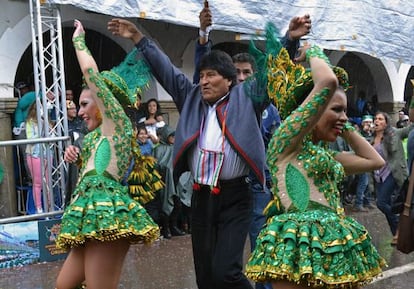Bolivian anthem strikes a sour note with Chile
Morales orders hymn calling for return of Pacific territory to be played at all official events

Among the numerous ongoing disagreements between Bolivia and Chile, there is one that strikes a particularly painful chord.
When President Evo Morales was sworn in for a third term late last month, La Marcha Naval (or, The Navy March) was played at his inauguration. The hymn – which is now required to be played at all official events in Bolivia – offended the small Chilean delegation in attendance at the ceremony.
In 1971, Chilean President Salvador Allende said Bolivia “will once again have sovereignty” on the Pacific coast
Sergio Muñoz, a high-ranking judge who led the delegation, complained when he returned to Santiago how he had to stand while members of the Bolivian Congress sang that Antofagasta – a Chilean city in the north of the country – will be “returned to the fatherland.”
Also known as the Himno al Litoral (or, Hymn to the Coast), the anthem was approved through a decree by Morales in April 2011 just days after Bolivia filed a lawsuit against Chile at the International Court of Justice in The Hague to demand access to the Pacific Ocean.
Bolivia lost its coastline following the 19th-century War of the Pacific.
“Because of the lawsuit that was filed at The Hague, Bolivia is going through a period of nationalistic pride similar to that seen in 1979, when the War of the Pacific’s centennial was celebrated,” said historian Pablo Michel.
It was around then that Edgardo de la Vega and Gastón Velasco wrote the Himno al Litoral. Velasco would often state that “anyone who doesn’t hate Chile is not a real Bolivian.”
According to the Chilean Foreign Ministry, Morales’ decree as well as the song are being used to support Bolivia's legal battle. The lyrics “expose what is truly behind the lawsuit, which is simply a call for an expansion of Bolivia’s borders, something that will affect the 1904 Treaty,” said assistant secretary for Foreign Relations Edgardo Riveros.
Bolivia could also present as evidence an interview that took place in 1971 at La Moneda presidential palace in Santiago between President Salvador Allende and Bolivian writer Néstor Taboada.
“Bolivia will again have sovereignty over the Pacific coast,” the late president said.
Last Sunday, the Bolivian government took out a full-page ad in the Chilean daily El Mercurio with a picture of Allende and Taboada, along with the president’s statement.
The ad was part of an ongoing verbal spat between Morales and Chilean Foreign Minister Heraldo Muñoz.
On February 17, the Bolivian president said in a radio interview: “Allende was a genuine socialist, not like those fake socialists in Chile today.”
During a radio interview, Morales slammed the “fake Socialists” governing in Chile today
Hours after his statement, Muñoz wrote on his Twitter account: “But Pres. Allende never negotiated the sea and respected treaties.”
Mario Osses, a Chilean politician who supported Allende, said he sat in on the interview and confirmed what Allende told Taboada, explaining it was “a fraternal and pragmatic agreement” with Bolivia.
The Bolivian government will argue before the international court in May that there have been many offers throughout the years by Chilean leaders, including dictator Augusto Pinochet, to give La Paz access to the Pacific.
Chile, meanwhile, will accuse Bolivia of wanting to tear up the 1904 Treaty which formally put an end to the Pacific War and divided territory between Chile, Peru and Bolivia, making the latter a landlocked country.
Tu suscripción se está usando en otro dispositivo
¿Quieres añadir otro usuario a tu suscripción?
Si continúas leyendo en este dispositivo, no se podrá leer en el otro.
FlechaTu suscripción se está usando en otro dispositivo y solo puedes acceder a EL PAÍS desde un dispositivo a la vez.
Si quieres compartir tu cuenta, cambia tu suscripción a la modalidad Premium, así podrás añadir otro usuario. Cada uno accederá con su propia cuenta de email, lo que os permitirá personalizar vuestra experiencia en EL PAÍS.
¿Tienes una suscripción de empresa? Accede aquí para contratar más cuentas.
En el caso de no saber quién está usando tu cuenta, te recomendamos cambiar tu contraseña aquí.
Si decides continuar compartiendo tu cuenta, este mensaje se mostrará en tu dispositivo y en el de la otra persona que está usando tu cuenta de forma indefinida, afectando a tu experiencia de lectura. Puedes consultar aquí los términos y condiciones de la suscripción digital.








































